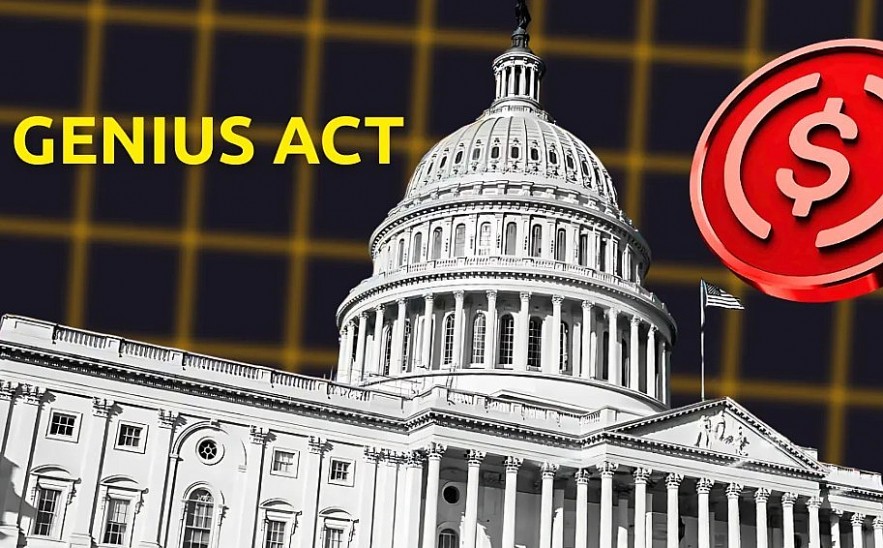What Is the GENIUS Act? The U.S. Stablecoin Regulation Bill
 Elon Musk Announced $20 Million Cryptocurrency Giveaway: Fact-Check Elon Musk Announced $20 Million Cryptocurrency Giveaway: Fact-Check |
 The Rise of the Digital Dollar: What the U.S. CBDC Could Mean for Your Wallet The Rise of the Digital Dollar: What the U.S. CBDC Could Mean for Your Wallet |
In one of the most consequential moves for U.S. crypto policy to date, the Senate has advanced the GENIUS Act—a sweeping bill aimed at bringing federal oversight to stablecoins, a fast-growing class of digital assets. Passed with a 66–32 vote, the bill marks a historic attempt to impose rules, transparency, and consumer protections on a market currently worth over $250 billion. But beneath the bipartisan momentum lies controversy, from alleged Trump family ties to global tech interests jockeying for position.
Here’s a complete breakdown of the GENIUS Act—what it does, why it matters, and what it could mean for the future of digital money.
 |
| U.S. Senate Moves GENIUS Act Forward with 66-32 Vote |
What Are Stablecoins?
Stablecoins are digital currencies pegged to real-world assets like the U.S. dollar, gold, or government bonds. Unlike Bitcoin or Ethereum, which can be highly volatile, stablecoins are designed for price stability. This makes them ideal for:
-
Everyday digital payments
-
Cross-border remittances
-
Decentralized finance (DeFi) platforms
Popular examples include USDC, Tether (USDT), and emerging government-backed tokens. But rapid growth has outpaced regulation, and many fear stablecoins could pose risks to financial stability if left unchecked.
What Does the GENIUS Act Do?
The GENIUS Act—short for Guiding and Establishing National Innovation for U.S. Stablecoins—aims to:
Create a Federal Framework
-
Designates only approved “payment stablecoin issuers” to operate legally in the U.S.
-
Subjects issuers to regulatory oversight by the Federal Reserve and Treasury.
Enforce Transparency
-
Requires 100% asset-backed reserves (e.g., dollars and short-term Treasuries).
-
Monthly public disclosures of reserves.
-
Annual audits for large issuers ($50B+ market cap).
Protect Consumers
-
Stablecoins can’t be marketed as FDIC-insured or government-backed.
-
In case of bankruptcy, stablecoin holders get priority over other creditors.
Limit Foreign Influence
-
Foreign issuers must comply with U.S. standards or face designation as “noncompliant.”
Why Is It Controversial?
The bill stalled earlier this year amid concerns from Senate Democrats over possible conflicts of interest tied to the Trump family and a firm called World Liberty Financial. That company launched a stablecoin backed by Middle Eastern investors, raising red flags over transparency and corruption risks.
Critics like Sen. Elizabeth Warren argue the bill lacks teeth on enforcement and could “turbocharge” the stablecoin industry without adequate safeguards.
Others, like Sen. Rand Paul, oppose it for overregulating innovation.
What Revived the GENIUS Act?
Bipartisan negotiations—particularly efforts by Sen. Mark Warner—pushed the bill back on track. Warner called it an “imperfect but necessary step” to avoid regulatory chaos. Senate Majority Leader John Thune emphasized that the process was open and collaborative, aiming to strike a balance between innovation and accountability.
What Happens Next?
The GENIUS Act has cleared its biggest procedural hurdle in the Senate. Next stop: the House of Representatives. If passed, it will go to the President’s desk for signature—potentially becoming the first U.S. law specifically targeting stablecoins.
What the GENIUS Act Means for the Crypto Industry
-
Regulatory clarity: Firms like Circle and PayPal could operate under clear, federal rules.
-
Consumer confidence: Investors may trust regulated stablecoins more.
-
Innovation pressure: Startups and global players may pivot operations to comply—or exit the U.S.
-
Global precedent: Other countries could look to the U.S. model to shape their own crypto laws.
Final Word
The GENIUS Act could define how America handles digital dollars. Whether it becomes law or not, it’s a loud signal: Washington is done watching from the sidelines. The rules of crypto engagement are coming—ready or not.
FAQs: The GENIUS Act and Stablecoin Regulation
What does GENIUS stand for?
GENIUS stands for Guiding and Establishing National Innovation for U.S. Stablecoins.
Is the GENIUS Act a law yet?
Not yet. It has passed a key Senate vote but still needs approval from the House and the President.
Who supports the GENIUS Act?
The bill has bipartisan backing, including Sen. John Thune (R) and Sen. Mark Warner (D).
Who opposes it and why?
Sen. Elizabeth Warren and Sen. Josh Hawley are vocal critics, citing insufficient oversight and Big Tech influence.
What happens if stablecoins remain unregulated?
Analysts warn of financial instability, fraud risks, and the U.S. falling behind in global fintech leadership.
Will this affect my crypto wallet or DeFi platform?
If you use stablecoins, yes. Issuers will need to comply with federal standards, which could impact how tokens are issued or redeemed.
 Cryptos Unusually Bullish - Taking Advantage of Luna Disaster Cryptos Unusually Bullish - Taking Advantage of Luna Disaster The memecoins that followed LUNA's collapse have many unusual signs, high risks for investors. |
 Who Are The Crypto Speculators - Not Investors? Who Are The Crypto Speculators - Not Investors? There is no tool to save the value of cryptocurrency other than shouting and believing, people will trample each other, sell when it drops in ... |
 Top 10 Most Popular Cryptocurrencies In the U.K Today Top 10 Most Popular Cryptocurrencies In the U.K Today Explore the top 10 most popular cryptocurrencies and learn how to engage in cryptocurrency trading in the UK. |
 Top 10 Most Popular Cryptocurrencies In Germany Top 10 Most Popular Cryptocurrencies In Germany Explore the top 10 most popular cryptocurrencies and learn about cryptocurrency trading in Germany. |























